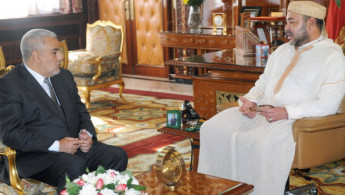Morocco: Royal Palace and Islamists brawl over Rabat's ties with Israel
The Moroccan Islamist opposition party denied having "an internal partisan agenda" on the question of Palestine, asserting its right to freedom of expression, after being severely reprimanded by the Royal Palace over "interfering" with the monarch's duties.
On 13 March, the royal cabinet castigated, in an unprecedented move, what it described as the "irresponsible" and "dangerous" behaviour of the Party of Justice and Development (PJD), which recently accused Moroccan diplomacy of a pro-Israeli bias.
After two days of silence, the leadership of the PJD finally commented Wednesday on the royal cabinet's released statement, saying that the party's positions "are exercised within the framework of the freedom of expression guaranteed in all its forms by the Constitution".
In the same press release, the moderate Islamist party assured "not to deviate from its firm and frequent positions in support of the Palestinian cause and people nor from its rejection of normalisation" between Morocco and Israel, while claiming to "accept the observations and warnings issued by His Majesty".
بلاغ الاجتماع الاستثنائي للأمانة العامة للمصباح يوم 14 مارسhttps://t.co/HG8q1Axq3l
— حزب العدالة والتنمية PJDMAROC (@PJDofficiel) March 15, 2023
The royal cabinet claims that the opposition party was "instrumentalising" the Palestinian cause and giving in to "political one-upmanship and narrow electoral campaigns".
"Morocco's position towards the Palestinian question is irreversible. (...) The foreign policy of the kingdom is a prerogative of His Majesty under the Constitution," added the press release from the royal palace.
The 2011 constitution guarantees to the Moroccan King "accreditation of ambassadors to foreign countries and international organisations" and the "signing and ratifying treaties."
The PJD argues that Foreign Minister Nasser Bourita, whom they accuse of "defending the Zionist entity (Israel)" on the international scene, is "a member of the government that can be subject to criticism like the rest of his colleagues".
Reaching to the party's secretary, PJD retreated from adding further comments on the controversy. Local media reported that the head of the party Abdelilah Benkirane restricted "his brothers" in the party from making any further comments to the media.
The former anti-normalisation advocate Abdellatif Ouahbi, minister of justice and head of the majority Party of Authenticity and Modernity (PAM), has also reportedly restricted his party's members from comments on the royal release.
Rabat normalised ties with Tel Aviv late in 2020 under the leadership of Saad Eddine El-Othmani, prime minister and head of PJD at the time.
El-Othmani's move divided the party and further angered PJD's supporters after a decade of economic and political chaos.
After a tragic loss in September 2021 elections, the party re-elected its former controversial leader Abdelilah Benkirane as the new secretary-general. Benkirane has since admitted that "normalisation was a mistake."
In an interview with Al-Araby TV last year, El-Othmani said he was under pressure and that his long-standing anti-normalisation position has never changed.
"That moment [signing the normalisation deal] was painful and difficult. But it was a decision of a state and I was head of government," added the former prime minister in his first interview since leaving the office.
Nevertheless, despite the normalisation, the kingdom continues to regularly reaffirm its commitment to the Palestinian cause - "one of the priorities of its foreign policy" - under the leadership of King Mohammed VI, who chairs the Al-Quds committee - an institution responsible for "preserving the Arab-Muslim character" of Jerusalem.




 Follow the Middle East's top stories in English at The New Arab on Google News
Follow the Middle East's top stories in English at The New Arab on Google News

![A group of Palestinians, foreign and Israeli activists gather to participated in an olive picking event on the land in the town of Battir, which is under threat of confiscation by Israel in Bethlehem, occupied West Bank on 8 November 2024. [Getty]](/sites/default/files/styles/image_330x185/public/2182930803.jpeg?h=199d8c1f&itok=__0LgGsa)
